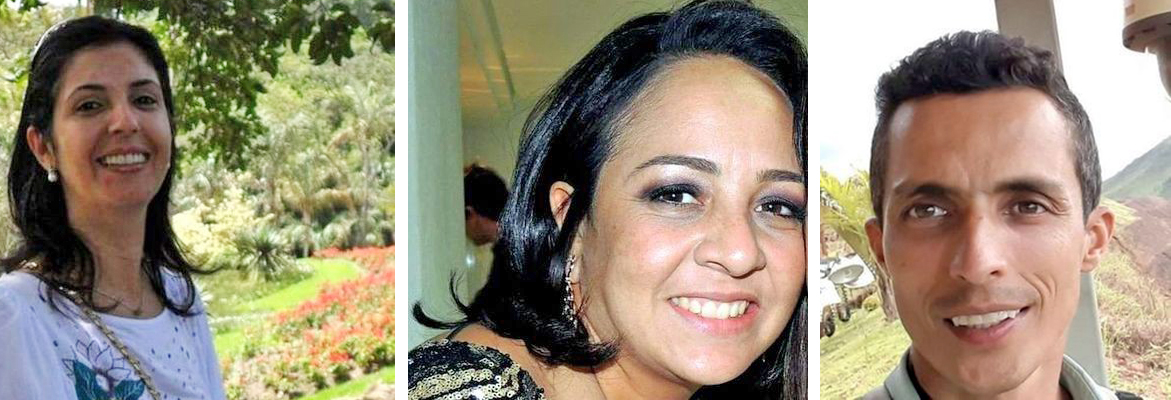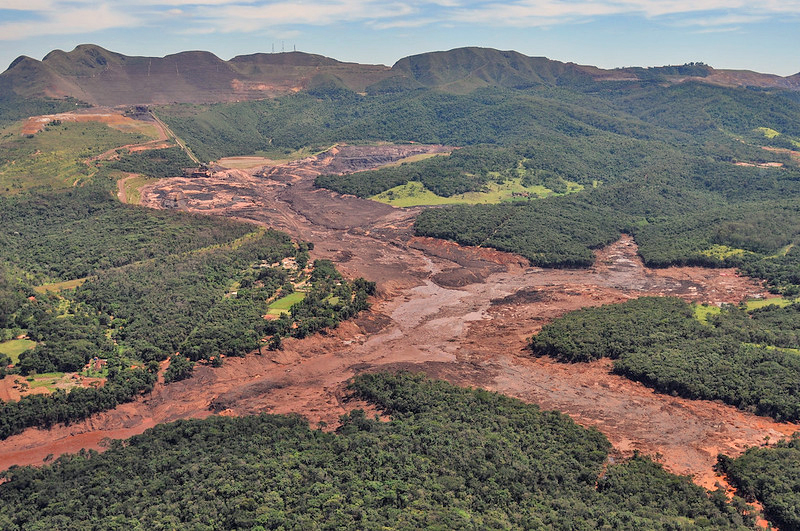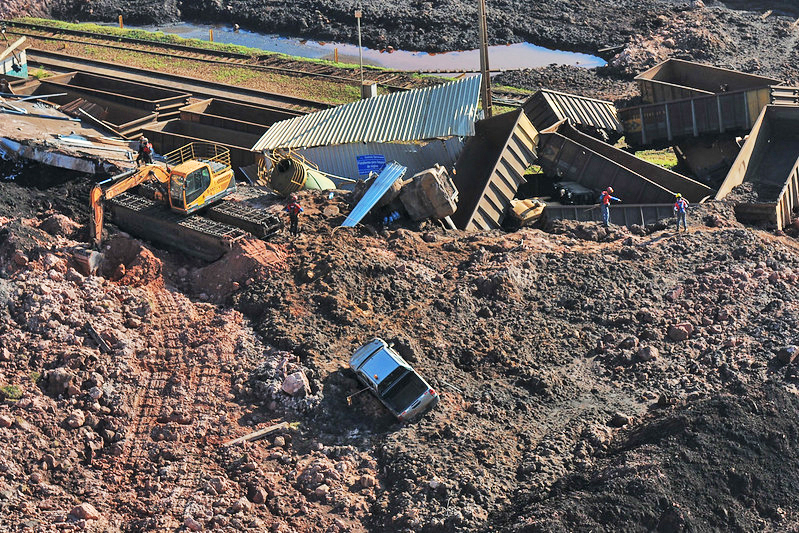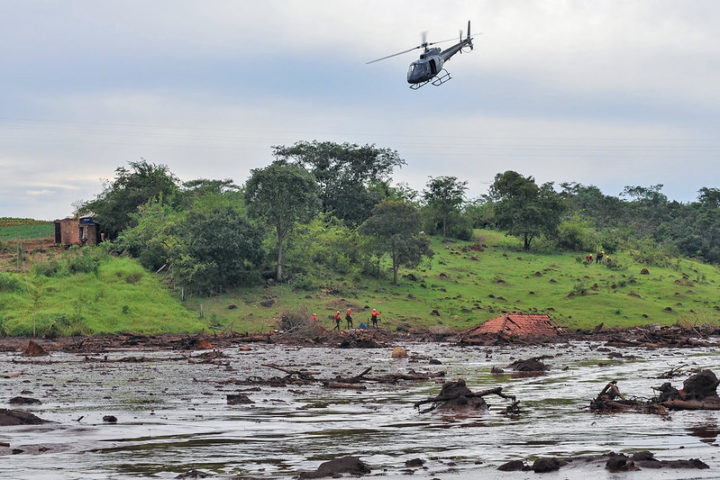By Marcelo Z Carota*
Right in the path of the biggest dam breach accident in Brazil, this little town was devastated by a tragedy that claimed many lives among the local population. According to a report by the UN Environment Agency, the figures are among the eight largest environmental disasters in the world. If all that wasn’t enough, Brumadinho imposes two challenges on the six mayoral candidates in the coming elections on November 15.
Running for re-election, the current mayor, Nenen da Asa (PV), along with Antônio Brandão (MDB), Bruno Johnny (DC), Cláudio Teixeira (PRTB), Professor Márcio Guru (PTB), and Reinaldo Fernandes (PT) will first have to convince most of the population to change their minds about the inefficiency of politicians in their lives and go to the polls to vote. The elected officials will then have to convince the legal entity responsible for the tragedy, Vale S.A, the second-largest mining company in the world, to change its relationship with the families of the victims and the city.
“Situations such as the tragedy in Brumadinho pose great challenges for the State and society, as they show the precariousness of institutions in the face of the excessive progress of companies on natural goods and common use.”
The analysis is by the full professor of the Department of Anthropology and Archaeology of UFMG, Andréa Zhouri. The professor coordinates research and extension projects on policies to repair the disruption, in 2015, of the Fundão Dam in Mariana. The disruption was caused by Samarco, a Vale’s venture in partnership with a multinational mining and oil giant, Anglo-Australian BHP Billiton.
Problems involving the tragedy dragging on for almost two years show the scale and complexity of these challenges.
Losses and damages
On January 25, 2019, the dam’s breach at Córrego do Feijão Mine caused a landslide, at the speed of 80km/h, of almost 12 million cubic meters of ore tailings, killing 272 people, 259 of them Vale employees. Of the total, 11 victims have not been found to date.
This is the case of Lecilda de Oliveira, mother of two children, 49 years old at the time, 30 of them devoted to Vale. “We’re close to her second mud-covered anniversary. Do you think it’s fair to do this with one of their oldest employees, who dedicated herself to that company until death?” asks Natália de Oliveira, 48, sister of the victim. “A few months after the tragedy, Vale, which has an army of the best lawyers in the country, forced a deal, and the families, still feeling emotionally fragile in every way, accepted.”
With the agreement, parents, spouses, and children of the victims each received R$ 700 thousand for moral damages compensation. Brothers received R$ 150 thousand each. However, according to Natália, it omitted life insurance that Vale makes for each employee for 2,6 million dollars (just over R$14 million, in today’s quotation). Still, only R$ 2,6 million have been paid so far. Even facing a torrent of lawsuits, Vale’s reaction is impressive, just filing out appeals that should drag on and on in court.
Also controversial is Vale’s refusal to settle labor rights, such as to bear the 40% due to the Workers Severance Fund (FGTS). “It seems that a person did not die-in-service for the company, but actually was treated as if she abandoned the service, becoming a leaver,” says an offended Josiane Melo, 39, president of Associação dos Familiares de Vitimas e Atingidos do Rompimento da Barragem Mina Córrego Feijão Brumadinho (Avabrum. Josiane lost a sister killed in the disaster, the civil engineer Eliane Melo, 39, who was five months pregnant, which has further strained the family’s relationship with Vale.
Eliane was found 69 days after the dam’s breach. The company claims it was not possible to prove her pregnancy.” With this, Vale counts fewer victims and pays fewer damages. Ironically, this comes from a company whose motto and management policy are ‘Life first’ ” highlights Josiane, also an employee of the mining company, but on social security (INSS) leave since the tragedy.

Left to right: Lecilda de Oliveira, Eliane Melo and Vagner Nascimento. Avabrum Photos
Vale’s criteria to account for the victims also represent a drama for the housewife Arlete Silva, 57, and her husband, retired Alberico Silva, 62, parents of Vagner Nascimento, who died at 39 in that tragedy, leaving a wife and 16-year-old daughter. Six months after the searches began, only his right leg was identified by DNA and handed over to his family, who refused to dismiss the case.
“To Vale, my ‘Vaguinho’ is just one less person for them to worry about because they already gave me his leg, but for me, no, he’s still missing. I brought him to the world whole and went to work that day in perfect condition, so I shall have the right to bury him whole. All I want is to give a decent burial for our beloved son,” says a fallen-to-pieces mother.
Since then, every day at 6 pm, Vaguinho’s father, leaves the lethargy imposed by chronic depression and performs a ritual: he goes to the gate of the house to wait for the medical forensic Institute (IML) to show up and to give him the rest of his son’s body. It was at this time that, during the 15 years he worked as a grader operator at the dam, Wagner arrived at his house, really close to his parents’ house.
Alberico’s wait should take time: there is still an area with 5 million cubic meters of tailings to be inspected. Due to the Covid-19 pandemic, searches were halted last March and only recently have restarted working.
On this issue of reparations due by Vale, except for candidate Bruno Johnny, who did not respond to the interview requests, the candidates have a convergent proposal: being faithful to the Judicial system, including the Public Attorney’s Office, and bound by the agreements signed between the City Hall and the company, and in partnership with the State government, all of them demand full compensation (material, labor, moral, and health) to the families of the victims and those affected by the tragedy, as well as total compensation (financial and environmental) to the municipality.
Discredit justice and politics
What most revolts Arlete and Josiane is the assurance that this tragedy could have been avoided. According to Arlete, six months before the breach, her son had made a brief remark that he thought the presence of mining engineers surveying a possible crack in the dam was weird. Wagner’s suspicion echoes in Josiane’s statement:
“In July 2018, there was already cracking in the dam. No wonder, out of nowhere, Vale ran an escape drill, something that had never been done before. At the time, it seemed like a safety procedure for us who worked there, but when it broke down, we fully understood. It’s all pointed out in the parliamentary committees of inquiry (CPI) that have already been made. They should have gotten everyone out of there, but they didn’t do it nor did they warn anyone of the risks involved. Vale chose to kill out of greed,” he says.
Indignation extends to justice and politics, from which they expected more incisive actions in holding the company accountable for the tragedy and its consequences. “In this country, justice does not respect the laws; all it respects is money,” shoots Arlete, who will not leave her house to vote. “I’ve given up hope in the human being,” she confesses.
The disbelief in politics was confirmed by four candidates running for mayor, as well as members of the national coordination of the Movimento dos Atingidos por Barragens (MAB), who is always acting close to most of the 57 thousand inhabitants of Brumadinho.
They estimate that approximately 60% of the population believe that Vale is in charge of the city. Thus, they do not expect changes with the elections, regardless of who is elected.

Paraopeba River. Photo Felipe Werneck/Ibama
The Labor Party candidate, Professor Márcio Guru, cites a case that explains the popular inference of the company’s power in the city: At the beginning of the pandemic, the mayor decreed a temporary shutdown of Vale’s outsourced companies’ activities. Two days later, the decree was repealed by the State court.
Sonia Maranho, from MAB, recalls that, at the time of the disaster, the then United Nations Special Rapporteur on Human Rights and Toxic Substances, Baskut Tuncak, made a report recommending that the case be investigated not as an accident but as a crime. But there was no political mobilization in this regard. “With this, the population feels that the government interferes little in their defense. That’s sad because the solution is political,” wails another MAB coordinator, Joceli Andrioli.
The feeling of political abandonment is reinforced by the work of Minas Gerais’ governor, Romeo Zema (Novo Party), whose most significant concern, says Andrioli, has been with Vale’s counterpart to the State.
That is an opinion shared by mayoral candidates Breno Carone and Reinaldo Fernandes, who highlight Zema’s performance so far, only to ensure that Vale paid the R$54 billion owed to the State to repair collective moral and social damages. Last Thursday, 22, however, Minas Gerais’s governor, in an interview with Radio Itatiaia, signaled to accept a deal for a lower value to carry out works throughout the State. “It’s better to get X now than 3X years from now,” Zema said.
Tragedies and illnesses
The physical and mental health of Brumadinho’s population has been poor since the disaster.
Because it is a small town, everyone had some bond (family, friendship, professional, affective) with one or more dead casualties. Thus, all developed a trauma of some sort, varying only its degree, from where a significant portion of the population seeks some form of mental health treatment. The most common causes are depression, panic syndrome, and insomnia. The most serious, a desire, or a significant suicide attempt (five so far).
The most significant demand for treatment is in the public network via the Psychosocial Support Center (CAPS). Still, private care is also provided via Vale’s health plans as part of the agreement to compensate the victims’ relatives.
In addition to therapy, many resort to medication. After the disaster, and bogged down in the Covid-19 pandemic, consumption of anxiolytics and antidepressants increased by 70%, and Rivotril by 156%. “Tragedies cause illness mostly due to the loss of a life project,” says José Geraldo, a pharmacist and also a member of MAB.
Enhancing emotional fragility, the real threat of contamination comes from ore tailings. “The Paraopeba River is proven to be contaminated. Mining sludge is rich in up to 12 heavy metals, each with a different effect on human health. The most common are lymphatic and lung cancer. That stuff is sitting on the river’s banks. The mud dries, becomes fine dust, and then inhaled. Back in Mariana, human health risk assessment studies have classified urgent danger to public health. That is: it either removes mud, or it removes people. That can be repeated in Brumadinho, by bioaccumulation, but Vale denies this risk,” warns José Geraldo.

Photo Felipe Werneck/Ibama
Healing promises
With small variations, more rhetorical than practical, applications converge on the same proposals regarding public health.
Hiring, temporarily, or by competition, is vital for us to have more trained professionals for CAPS and primary health care. These workers should be well paid from a budget cut, which the current mayor’s opponents define as excessive political posts (350, according to the PRTB candidate Cláudio Teixeira), which overburden the city’s budget. “Brumadinho’s spending on personnel reaches R$ 6 million per month, of which R$ 3,5 million is for formal public employees and R$ 2,5 million is for commissionees,” says Professor Márcio Guru of PTB Party.
Nenen da Asa refutes the accusations: “The mayor should know how many employees there should be. Health care in the city is well approved, actually one of the best in the State. Still, I’m hiring more professionals and opening the Regional Hospital.”
Concerning the municipality’s health care system and its future, the following are unanimous in the diagnosis: Brumadinho can no longer be so dependent on Vale, responsible for almost 60% of its revenue. In 15, 20 years, the exploitation of commodities is coming to an end, so it is necessary to invest in attracting companies from other segments, such as tourism, ecotourism, and family farming (which already accounts for the second-largest revenue in the city) and technology.
But, returning to the second paragraph of this article, the first challenge is to convince the population to change their minds and go vote. Most complain that when they needed the politicians the most, none of them came to the people. It happens precisely the other way round. It is the people who had to go looking for them. They also complain that very few of the six leading candidates running for mayor were present at the acts of love that families promote every 25 days in memory of the victims.
Read also
After devastation caused by Vale Brumadinho’s City Hall supports mining in the Park
* Journalist and writer.
Traduction by José Luiz Corrêa da Silva










